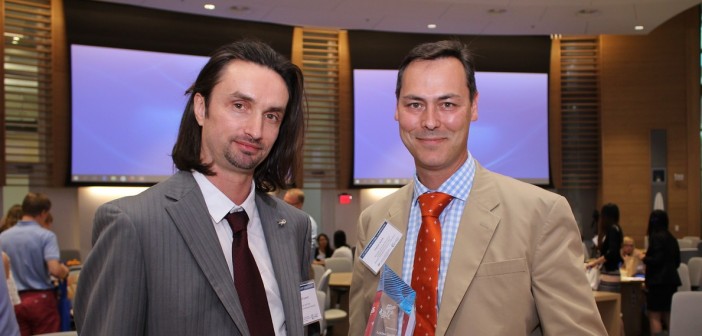Layton Smith, PhD, director of drug discovery at SBP’s Lake Nona campus and Sumit Chanda, PhD, professor and director of the Immunity and Pathogenesis Program, were both plenary speakers at the University of Florida Drug Discovery Symposium held Friday, April 29.
Chanda spoke on systems-based approaches to drug discovery—using large-scale and big-data driven approaches to identify new drug targets and drugs. This strategy has enabled Chanda’s team to identify numerous novel human (host) targets and small molecules for the development of antivirals against influenza and HIV. Host targets are increasingly sought as a means to prevent viral transmission since they are more stable compared to viral targets that mutate frequently, causing drug resistance.
“The strategies we use aren’t limited to infectious disease,” said Chanda. “We make an active effort to share the tools we develop with the whole biomedical community so they can be applied to find drug targets for all sorts of diseases.”
Smith presented examples of small molecule discovery projects pursued by his group. One of these was a novel approach to finding small molecule activators of GPR20, an “orphan” receptor, so-called because the types of molecules that activate and inhibit it remain unknown.
The lack of knowledge about GPR20 and the other 200 orphan receptors to which it is related can be attributed in part to the lack of tools available to study them. Many of these have been linked to human diseases—for example, GPR20 may play a role in bipolar disorder and gastrointestinal problems.
Smith’s team used its ultra-high throughput screening (uHTS) robots and a novel cellular assay to scour their library of over 300,000 compounds to find one that could activate GPR20 and facilitate further research in this area.
“This work demonstrates that we can apply a uHTS strategy to find tool compounds that will allow us to exploit the potential of orphan receptors for new therapeutic discovery,” said Smith.
This meeting brought together leaders in the field working on a variety of topics, from finding new uses for natural products to developing faster, cheaper, more sustainable ways to synthesize drugs. The diversity likely shed new light on how participants see their work, which ultimately may advance new approaches for drug discovery.
